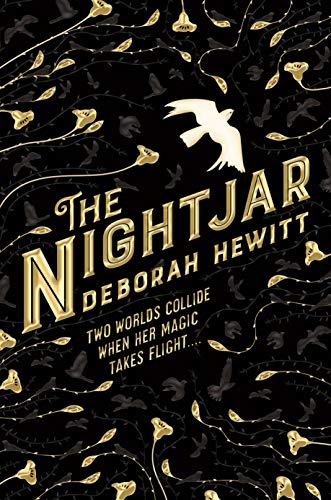
![]() The Nightjar by Deborah Hewitt
The Nightjar by Deborah Hewitt
Deborah Hewitt’s The Nightjar (2019) is one of those debut novels that in many ways feels like a first novel, with all the issues that may conjure up, but that despite those issues leaves you eager to see where the author goes with her next novel.
Hewitt starts off with a gripping, chilling prologue, then shifts to present-time London where Alice Wyndham receives an odd gift that precipitates her being flung into a long-running conflict between a species of people with special abilities, most of whom live in an alternate near-copy 1930’s-style London (called The Rookery), and a secret society (unfortunately known as the Beaks) who seeks to destroy them. There’s also a death-cult trying to instigate a world-ending apocalypse thrown into the mix for good measure. Alice herself, she learns, is one of those who can perform “magic.” More precisely, she is an extremely rare “aviarist,” one who can see people’s nightjars — birds that guard as well as reflect each person’s soul and then depart upon that person’s death. Alice’s introduction to all this comes via the mysterious Crowley, who takes her off to the Rookery ostensibly for her protection, but his full motives are unclear.

Deborah Hewitt
There’s a lot to like in The Nightjar. Hewitt’s prose is fluid, engaging, and often lush, particularly in her description of the Rookery. The world-building isn’t so much detailed (though it is that in places) as much as efficiently rich and easy to revel in, whether it’s the background of the Rookery, the magical powers, or the description of the land of the dead. The nightjars are a bit reminiscent of Philip Pullman’s daemons, but not so much that one would call them derivative. Hewitt mostly shows a deft hand with pacing, as the story moves along quickly and smoothly, though I wouldn’t have minded a few more quiet moments and the ending does feel a bit rushed.
The positives are somewhat (not totally) balanced out by several negatives. The potential romance between Crowley and Alice feels pretty perfunctory, and had it been completely dropped I don’t think it would have had any negative impact on the story. Side characters have potential, but we only get a tease from them and then no further development, even though several (especially one with a traumatic event in her past) are rich for mining. The villains are particularly weak and two-dimensional. Some plot lines basically disappear. And while Alice is a likable enough main character, she does fall too much into a pattern of choosing the worst, most impulsive action, seemingly more to drive the plot than anything else. Seeing her learn a bit from past errors would have strengthened her development.
The issues aren’t minor ones, but on balance they’re outweighed by the many strengths, particularly the imaginative content and the writing style. The Nightjar is a solid enough book, but as noted at the top, I’m definitely interested in seeing what Hewitt does with a bit more experience behind her.



I saw this book this weekend, but I didn’t pick it up. Maybe I’ll get it this week.